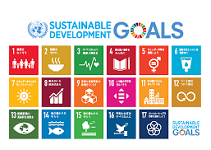African countries should learn from the experience of each other including successes, challenges and lessons learned, with a view to accelerating the implementation of the 2030 Agenda and Sustainable Development Goals (SDGs), says Deputy Executive Secretary and Chief Economist, ECA, Hanan Morsy
Ms Morsy was speaking at a plenary round-table panel on national and subnational actions and reviews to speed up and scale up implementation in Africa. The panel discussion was on voluntary national reviews (VNRs) and peer learning to strengthen country-level interventions at the ongoing 9th session of the Africa Regional Forum on Sustainable Development (ARFSD-9) in Niamey, Niger.
“Countries should ensure the engagement of young people as key stakeholders in voluntary local and national reviews (VNRs & VLRs),” said Ms Morsy. VNRs, she said, seek to strengthen policies and institutions of governments and mobilize multi-stakeholder support and partnerships for the implementation of the Sustainable Development Goals.
Marguerite Ramadan, Minister of Gender Affairs and the Protection of Women, Families and Children, Central African Republic (CAR) said the Covid19 pandemic, which led to border closure ensured rapid information sharing, hence a reduction in the number deaths in the country. CAR has developed policies and programs on free vaccination, including vaccination of children and pregnant women.
“The biggest challenge now is the climate change crisis. The President has put in place structures for risk reduction and adaptation of climate change. It will be passed to department of disaster prevention and management to address the effects of climate change in the country,” said Ms Ramadan.
To address challenges faced on data collection, the country received funding and technical support from the United Nations. There is need for the country to invest in information and communications technology that can contribute to the timely collection, dissemination and use of data and information for the reviews
Kasapo Manda, Co-Chair, African Youth SDGs Summit, acknowledged ECA for its support to the youth in ensuring that the youth actively engage on matters of sustainable development in Africa. She said even though 70 % of productive and innovative population are youth, they are most unlikely to be engaged on matters of sustainable development at the local, national and regional level.
“Capacity building and funding resources are key to ensure young people participate in VNR as stakeholders,” said Ms Manda adding that countries should mobilize financing for SDGs through domestic resource, involving the private sector.
“We urge member states to allocate resources for youth networks to strengthen peer learning and build capacity. Strengthen mechanisms that will ensure the youth can be part of the next VNR and learn from the best practices.”
African countries, she said, should strengthen their resource mobilization for both conducting and implementing the recommendations resulting from voluntary national reviews on the sustainable development agendas and national development plans.
Modeste Kakanda, Coordinator, Observatory for Sustainable Development, Democratic Republic of the Congo, said it is difficult for DRC to effectively implement the SDGs following the effects of the pandemic. But the country has adopted a program for Covid management and mitigation.
To accelerate progress he said there is need to focus on local levels where people are more vulnerable. DRC is engaged in building more health centers and roads to help tackle issues of maternal and child deaths – still high in the country.
Najat Maalla M’jid, Special Representative of the UN Secretary-General on Violence against Children, said VNR should be more inclusive and more integrated, and institutionalised by government and local authorities for development.
“We need strong political commitment to ensure children’s rights are protected using child protection approach,” she said. “The clock is ticking. Investing in children is needed more than never. We need more birth registration, digital learning, social protection, education. Children must be seen as drivers of change.”

